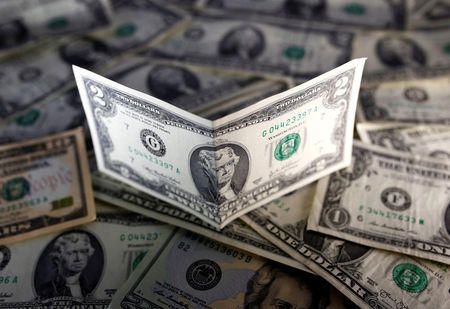The U.S. dollar showed modest gains on Tuesday, bolstered by its safe-haven appeal amid weakness in the technology sector on Wall Street. The Dollar Index, which measures the dollar against a basket of major currencies, edged up 0.1% to 105.160 at 04:20 ET (08:20 GMT). This increase followed a recent high of 105.91 reached last week, reflecting a cautious but positive sentiment towards the greenback.
Market Dynamics and Influences
The tech sector’s decline in U.S. equity markets contributed to the dollar’s strength, albeit marginally. Investors, particularly those sensitive to risk, sought refuge in the dollar amid concerns over the impact of technology stock sell-offs on broader market sentiment. This trend underscores the dollar’s role as a safe-haven currency during periods of market uncertainty.
Investor caution was palpable ahead of Friday’s release of the core PCE (Personal Consumption Expenditures) price index, a crucial inflation gauge closely monitored by the Federal Reserve. Fed officials have signaled that they would need more concrete evidence of inflation slowing down before considering potential interest rate cuts. Therefore, market participants are closely eyeing the upcoming data release for insights into the trajectory of U.S. monetary policy.
Political and Geopolitical Considerations
Political developments also weighed on market sentiment. The first U.S. presidential debate between President Joe Biden and former President Donald Trump was scheduled for Thursday, prompting analysts to speculate on potential outcomes and their implications for currency markets. Analysts at ING highlighted in a report that the debate’s outcome, especially if perceived to favor Trump, could influence the dollar’s short-term movement.
Euro and Pound Dynamics
In currency pairings, the euro (EUR/USD) edged lower by 0.1% to 1.0728 against the dollar. Political uncertainties surrounding the upcoming French elections added pressure on the euro. The French National Rally party’s announcements regarding potential fiscal policies, including cuts in France’s contribution to the EU budget funded by tax reductions, raised concerns about the stability of eurozone politics.
Conversely, the British pound (GBP/USD) saw a slight increase of 0.1% to 1.2696. Sterling remained steady as the Bank of England’s policymakers refrained from making significant statements ahead of the July 4 general election. However, market analysts anticipate potential dovish signals from some members of the Bank’s Monetary Policy Committee following the election, which could impact the pound’s strength in the medium term.
Asian Currency Movements
Across Asia, the Japanese yen (USD/JPY) traded 0.1% lower at 109.47 yen per dollar. The Bank of Japan’s minutes from its June meeting suggested discussions about the possibility of interest rate hikes in July, providing some support for the yen despite earlier warnings of intervention to curb excessive volatility.
Conversely, the Chinese yuan (USD/CNY) depreciated by 0.1% to 7.2628 against the dollar, marking a seven-month low. This decline followed a weaker midpoint fix by the People’s Bank of China, reflecting market concerns over potential trade tensions between China and Western countries. These concerns were exacerbated by European tariffs on electric vehicles, which Chinese officials suggested could lead to a trade war.
Market Sentiment and Outlook
Overall, market sentiment remains cautious as investors navigate a landscape shaped by economic data releases and geopolitical developments. Each of these factors has the potential to influence currency movements in the near term, prompting investors to adopt a wait-and-see approach while assessing risks and opportunities in global markets.
